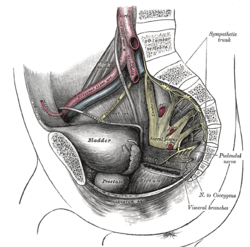Lumbosacral trunk
| Lumbosacral trunk | |
|---|---|
 Plan of lumbar plexus. | |
 Dissection of side wall of pelvis showing sacral and pudendal plexuses. | |
| Details | |
| From | L4-L5 |
| Identifiers | |
| Latin | truncus lumbosacralis |
| TA98 | A14.2.07.026 |
| TA2 | 6504 |
| FMA | 65535 |
| Anatomical terms of neuroanatomy | |
The lumbosacral trunk is nervous tissue that connects the lumbar plexus with the sacral plexus.
Structure
The lumbosacral trunk comprises the whole of the ventral rami of L5 and a part of L4.[1][2] It appears at the medial margin of the psoas major and runs downward over the pelvic brim to join the first sacral nerve.[citation needed]
The anterior division of the third sacral nerve divides into an upper and a lower branch, the former entering the sacral plexus and the latter the pudendal plexus.[citation needed] This connects the lumbar plexus and the sacral plexus.[2]
Clinical significance
The lumbosacral trunk may be compressed by the fetal head during the second stage of labour.[3] This causes some muscle weakness in the legs.[3] A full recovery is usually expected.[3]
Additional images
-
Lumbosacral trunk
-
Ramus communicans.Sacral symphatetic with S1.
Reference
- ^ Mirjalili, S. Ali (2015-01-01), Tubbs, R. Shane; Rizk, Elias; Shoja, Mohammadali M.; Loukas, Marios (eds.), "Chapter 46 - Anatomy of the Sacral Plexus L4-S4", Nerves and Nerve Injuries, San Diego: Academic Press, pp. 619–626, ISBN 978-0-12-410390-0, retrieved 2021-01-13
- ^ a b Katirji, Bashar (2007-01-01), Katirji, Bashar (ed.), "Case 5", Electromyography in Clinical Practice (Second Edition), Philadelphia: Mosby, pp. 117–124, ISBN 978-0-323-02899-8, retrieved 2021-01-13
- ^ a b c Goyal, N.; Chad, D. A. (2014-01-01), "Lumbar Plexopathy", in Aminoff, Michael J.; Daroff, Robert B. (eds.), Encyclopedia of the Neurological Sciences (Second Edition), Oxford: Academic Press, pp. 923–926, ISBN 978-0-12-385158-1, retrieved 2021-01-13
External links
- Anatomy photo:43:15-0103 at the SUNY Downstate Medical Center - "The Female Pelvis: The Posterolateral Pelvic Wall"
- posteriorabdomen at The Anatomy Lesson by Wesley Norman (Georgetown University)
- figures/chapter_30/30-6.HTM: Basic Human Anatomy at Dartmouth Medical School


